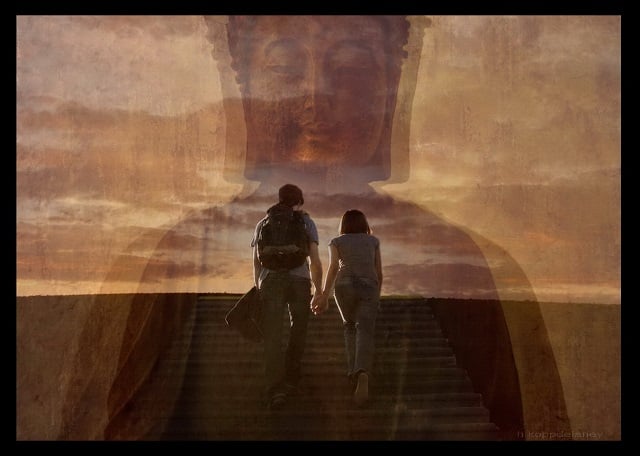
“You must love in such a way that the person you love feels free.” ~ Thich Nhat Hanh
.
Buddhism has been my source of wisdom for many years.
I’ve applied what I’ve learned from Buddhist philosophy to the area of love and relationships, and a major positive shift has taken place in my life.
The notion of Dharma is to see things as they are. That said, if we apply the teachings, an essential problem in our relationships can be solved. I’m convinced that one of our major problems is that we deny seeing the reality of things. We see everything from the lens of our ego, which desires things to be different. Consequently, our actions become unwholesome and harm us and our significant other.
Furthermore, Dharma teaches us awareness, which is quite crucial in dating. Without awareness, we might fall into the traps of our destructive thought patterns.
Although there are no rules to dating, it’s wise to adopt a few notions to enhance our dating life. Not only do we become happier, but we also make our significant other more comfortable around us and blessed.
Here are seven steps to start dating like a Buddhist.
1. Don’t dwell on the past. Buddhist philosophy teaches us that the past is only present in our minds. We keep it alive through constant mental activity, but we can’t return to it or change it. Having said that, to hold on to the past is futile. The present moment—the Now—is all that we ever have.
The issues that ensue from dating become severe with time because we dwell on them. It’s of benefit to take action in the present moment to fix whatever has gone awry. Nonetheless, merely dwelling on it won’t solve the problem.
2. Don’t blame. One of the wisest lessons in Buddhism is learning how to take responsibility for our actions and speech. During my Vipassana retreat, we put it to the test—how we create misery through our thoughts. Now, instead of pointing the finger at others, I change my own perspective first.
Blame has become a serious problem in dating. Whether we are at fault or not, we find it easier to blame our partner. However, we should understand that humility brings partners closer. If we’re wrong, it’s valuable to admit it. And if we believe that our partner is wrong, we can talk it out calmly—without blaming—and with willingness to change our perspective on the issue.
3. Know the motivation behind your actions. Buddhist philosophy encourages us to be aware of our daily motivations. During my Introduction to Buddhism course, we were told to make a list of what motivates us every day as we wake up. (For example, the list included not harming others and helping someone in need.) When we back up our actions with good motivations, our actions become wholesome.
Before taking action with our partner, it’s valuable to ask ourselves whether our actions are guided by our ego or by awareness. It’s imperative to put our ego aside if we’re opting to work on a relationship. We can create a list of motivations specifically for our partner: Listen to them, do not hurt them, understand them, do not attack them, and so on.
4. Give space. Dzongsar Khyentse assures us that for a relationship to work, we must know how and when to create space. We shouldn’t lose our individual life, nor should we cause our partner to lose his. Love is a beautiful experience, but sometimes we get so attached that we slowly lose our own identity.
Know that space is one of the most beneficial things in dating. Have a few hours during the day entirely for yourself. If you have had a fight, keep distance for a few days, so the bigger picture comes to the surface. Spend a few days during the week alone or with friends and family.
5. Have no expectations. The mind’s favorite hobby is to make up scenarios that don’t exist yet. We hold on to what we create and mistake it for reality. As far as I’m concerned, having expectations annihilates relationships from the very beginning. However, not expecting anything saves us heartache and allows us to enjoy the present moment.
Buddhism suggests staying in tune with what’s happening now, so we won’t be taken by our illusionary thoughts. We can try meditation to learn how to accept thoughts and let them be without holding on to them.
6. Forgive. In one of the Dharma talks I attended in India, the monk said that it is only ourselves who suffer the consequences of not forgiving someone—and it’s true. We only punish ourselves by holding a grudge, since it affects our own mental and emotional states. Releasing a past hurt feels like taking a burden off our chest.
Relationships might be frequently associated with pain because we all have a different point of view and a separate way of seeing and experiencing things. In order to keep the relationship healthy, we must learn how to forgive both ourselves and the other person.
7. Remember impermanence. The notion of impermanence is a key point in Buddhism. Buddhists advise us to keep in mind that everything is bound to end. It’s not a pessimistic notion—it’s realistic. When we acknowledge the impermanence of things, we don’t get as disappointed when we lose them.
Even if a relationship doesn’t end because of conditions, it will eventually end because of natural causes such as death. Remembering the impermanent nature of all things—including our loved ones—allows us to enjoy their presence without taking them for granted.
~
Author: Elyane Youssef
Image: elephant archives; Flickr/Hartwig HKD
Editor: Yoli Ramazzina






Read 1 comment and reply